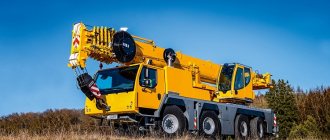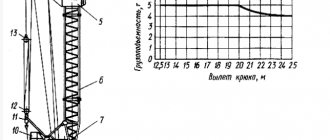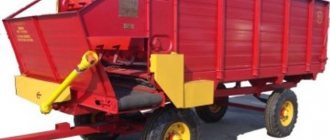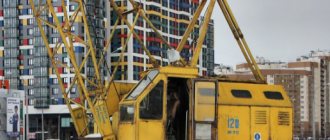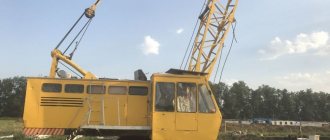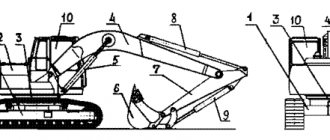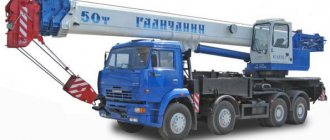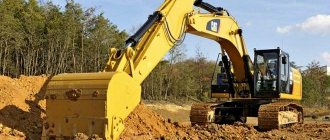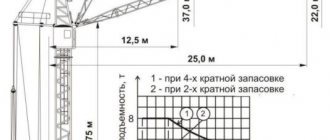The scope of application of KB-403 is varied. It can often be seen during the construction of residential complexes, administrative buildings, shopping and entertainment centers. The KB-403 tower crane has proven itself at large industrial enterprises and power plants. In the construction and installation of structures, the use of KB-403 significantly facilitates the movement of loads to the required height and significantly reduces work time.
A tower crane is used to transport heavy material, structures and concrete slabs to any point on a construction site. The index “4” indicates the size group (load capacity 8 tons). And the designation “03” indicates that the crane has a rotating tower.
KB-403 - self-mounting lifting unit
The KB-403 tower crane is a self-erecting lifting unit with electrical control, capable of moving on wheel-rail tracks. Equipped with a movable beam boom mounted on the same lattice tower and controlled by a system of ropes. Capable of lifting various loads to very high heights (up to the height of a 16-story building) with comparative compactness and coverage of a large work area.
Manual
The KB tower crane operating manual is the main document establishing the rules for handling the machine. It describes:
- unit device;
- the procedure for assembling the tower, boom, installing the trolley, hook clip;
- control of mechanisms;
- protection against rollover, overload;
- preparing the machine for transportation and moving to another site;
- operator requirements;
- the procedure and timing of maintenance, planned medium and major repairs;
- safety rules at all stages of operation;
- a list of service centers that provide warranty and post-warranty service and machine repair.
Tower crane KB-403 - general information
KB-403 tower cranes are assembled at specialized construction equipment factories in different cities of the Russian Federation and throughout the CIS: Nyazepetrovsk Crane Building, Moscow Stroymash Production Association, Karacharovsky Mechanical, Podolsk, Tashkent Mechanical Experimental Plant, etc. Factory assembly involves delivery to the working location crane with a finished chassis and a set of other elements of the tower crane, the assembly and installation of which takes place on the construction site in the following sequence:
- Crane rail tracks are installed and leveled.
- The chassis is installed using a medium-duty truck crane.
- The tower is brought into a vertical position.
- The boom is hung on the support hinges.
- The tower is extended and all components are adjusted using its own tower-type mechanisms.
Photo of tower crane KB 403
IMPORTANT! The crane can be transported to a new construction site already assembled and quickly installed using a truck crane and its own mechanisms.
Faucet extension
The design of the KB-403B crane allows the use of up to 6 inventory sections.
Faucet extension algorithm
- The roller cage lowers to the lower level of the portal
- The inventory section of the tower is installed into the portal using a truck crane.
- The tower is extended to the crane level and the section is secured to the crane tower
- At the time of extension, the tower is supported in a vertical position using a special holder with rollers located in the upper part.
- During the growing process, the tower is raised using a tower extension pulley, as well as guide rollers located on belts in two tiers of the portal - eight rollers in each
Scope of application
Cranes of the KB-403 type are particularly popular and the most widely used among other special lifting machines. They are used on large construction sites and facilities that require large volumes of construction or installation work, speed and high productivity:
- In the construction of residential or administrative buildings.
- On the construction of large industrial complexes.
INTERESTING! KB-403 is capable of performing absolutely all work on lifting any cargo on site, which allows significant savings on the use of additional lifting equipment.
Application
Among similar machines, the characteristics of the KB-403 optimally correspond to operating standards that require high performance and speed. The equipment will become an invaluable assistant in the construction of administrative and residential buildings, as well as in the construction of industrial complexes.
The crane in question is able to perform manipulations to lift any cargo to different heights, which ensures high labor productivity without the use of additional devices. The equipment belongs to the fourth size category in terms of load capacity and is equipped with a rotating turret. The increased tension determines a high coefficient of resistance to capsizing, along with operational efficiency.
Peculiarities
The KB-403 crane belongs to the IV size group (by load moment) of tower cranes, as indicated by the digital index 4 in the marking, and has a rotating tower (index 03). A sufficiently high load moment determines the special vehicle’s greater resistance to rollover and the high economic efficiency of its use.
Device
The convenience and productivity of the crane are also explained by its design features:
- The lattice structure of the tower and boom makes the structure lighter and provides greater precision of movement with a free view of the actions being performed.
- The cargo trolley, movably secured by hinges and cables to the boom, provides both vertical and horizontal transport of building parts and materials.
- The rotating platform of the tower is made in the form of a roller circle.
- The tower consists of several retractable sections with a collapsible head section and the possibility of growing from below.
- The KB-403 rope system is equipped with a pulley system.
- The cabin is installed unified for high-rise cranes with a height of up to 20 or more than 20 meters.
- The beam boom also has a sectional design.
- The crane can be equipped with a safety device with a coordinate-type protection system.
- Control is carried out both from the crane cabin and from the ground.
- For comfortable work in winter, the cabin is equipped with a heating system.
Scheme of tower crane KB-403
Specifications
To install the crane, rails of type P43 or P50 are used.
It can withstand wind loads from degree I to IV and temperature range from -40 to +40 0C.
The remaining qualitative and quantitative technical characteristics of KB-403 are presented in the table:
Technical features
| [ —>Download from server (647.3 Kb) ] | 2008-11-10, 5:59 PM |
| Options | Meaning |
| Control option | electric |
| Travel motor | 120 kW |
| Auxiliary motor for steering control | 5 kW |
| Limit height of the crane and gauge of its track | 54.7*6 m |
| Section size | 1.8 m |
| Allowable number of sections for extension | 5 |
| Turning radius | 3.8 m |
| Curb weight | 80 t |
| Counterweight plate | 30 t |
| Permissible lifting capacity with maximum and minimum boom extended | 3–8 t |
| Boom length | 30 m |
| Reach range | 5.6–30 m |
| Transport speed | 18 m/min |
| Permissible hook lifting speed | 55 m/min |
| Winch speed | 0.65 rpm |
KB-403 - general parameters of the series
Cranes began to be produced in Russia at the end of the 19th century, but production was sporadic.
After the Great Patriotic War, USSR factories began to produce up to 4,000 tower cranes annually, but they were all of different types, which hampered the development of crane construction.
In the post-war years the first series BKSM cranes was launched .
The construction was made of brick, so the devices were used mostly for reloading and supplying materials to the top.
In the second half of the 20th century, large-block, frame construction began to rapidly develop in the country, and in 1960, a series of design bureaus - Crane Bashennykh - was created and put into production . The series was designed for 8 models, not counting modifications.
Scope of application
With the help of KB-403 (alternative designation Kbk-160.2), all installation and construction work became mechanized.
KB-403 is also used in grain elevators and industrial enterprises , factories and power plants .
Lifting height of heavy weights up to 8 tons = 57.5 m. The crane performs all vertical and horizontal movements of building structures and materials at the work site to the desired location.
Differences KB-403
KB -403 - the first digit after the letter abbreviation of the model name is the number of the size group (4) for the load moment, the next 2 digits (03) - from 01 to 69 - indicate the rotary type of tower.
Further, the letters A and B indicate modification (improvement of the design while maintaining the basic parameters).
The boom is a triangular truss, in which the upper chord and braces are welded from pipes, and the lower riding chords are made from angles.
The boom is sectional, the maximum reach varies from 20 to 30 m.
Characteristics of KB-403B models
120
| 132 | ||||
| Load capacity, t | ||||
| maximum | 8 | |||
| at maximum horizontal boom reach | 3 | 3,5 | ||
| at maximum outreach of the inclined boom at an angle of 30° | 3,7 | 4,3 | ||
| Reach, m | ||||
| maximum horizontal boom | 30 | |||
| maximum inclined boom | 26,3 | |||
| at maximum load capacity | 15 | 16,5 | ||
| minimum | 5,6 | |||
| Maximum lifting height, m | ||||
| horizontal booms / number of sections | 41/6 | 35,4/5 | 29,8/4 | 24,2/3 |
| inclined booms | 54,7 | 49,1 | 43,5 | 37,9 |
| Maximum lowering depth, m | 5 | |||
| Rotation angle, degrees | 1080 | |||
| Speed, m/min | ||||
| lifting (lowering) loads up to 8 tons | 40 | |||
| lifting (lowering) hook suspension | 55 | |||
| smooth landing of loads up to 8 tons | 5 | |||
| cargo trolley with a load of up to 8 tons | 30 | |||
| crane movement | 18 | |||
| Rotation speed, rpm | 0,65 | |||
| power , kW | ||||
| main cargo winch | 55 | |||
| auxiliary cargo winch | 30/1,6 | |||
| jib winch | 15 | |||
| trolley winch | 5 | |||
| turning mechanism | 5 | |||
| crane movement mechanism | 5.5 x 2 = 11 | |||
| Total power of electric motors | 121 | |||
| Geometric parameters, m | ||||
| track x base | 6 x 6 | |||
| rear marker | 3,8 | |||
| Weight, t | ||||
| constructive | 50,5 | 49,2 | 47,9 | 46,6 |
| counterweights | 30 (+/-0,3) | |||
| Design load of the running wheel on the rail, kN | 270 | |||
| Seismicity, points | 1-6 according to SNiP II-7-81 | |||
| Wind district | III | V | VI | VII |
Device KB-403
The KB-403 turret is grown from below.
The main devices of the crane are located on the platform: the turning mechanism, winches (cargo and jib). On both sides, 2 counterweight blocks are secured with steel pins.
The support for the turntable is the running frame; they are connected using a support gear. The rotating mechanism on KB-403 is a roller circle (in 1 row), diameter = 2.5 m.
- The portal is mounted on a rotating platform, open at the top and bottom for the passage of tower sections.
- The rope system is equipped with pulley blocks.
- The mechanism can be controlled from the cabin and from the ground.
Characteristics of the main components
KB-403 tower is rotatable, which makes the crane easy to use on any construction site. The lattice design of the tower minimizes its overall weight. Unlike previous models, the head section of the tower here is collapsible.
Tower crane KB-403
boom is a beam type, has a classic triangular truss, and consists of sections that are attached to each other with flange connections. The boom reach can be changed by tilting it or moving the load trolley.
Strela KB 403
The load trolley moves along the entire length of the boom and is used for lifting and moving loads on a construction site. For this purpose, the trolley design is equipped with cables.
Cargo trolley KB-403
The turntable also has some differences from older models. The KB-403 turret rotation mechanism is a roller circle with a diameter of 2.5 meters. A portal is mounted on the plane of the turntable. At the rear, the transverse beam is equipped with rods to which a system of jib pulley blocks is attached. Counterweight slabs weighing 30 tons are placed on the transverse beams. On the side there are cabinets with a starter and controllers. A running frame is used as a support for the turntable.
The portal is necessary for expanding tower sections. The design of the KB-403 crane provides for the expansion of inventory sections in the amount of two to five units, which allows the boom to be raised to the maximum height of a sixteen-story building. The portal can be opened to receive sections from both the top and bottom.
The rope system of the tower unit is equipped with block systems (pulley hoists).
Cabin Feature
The cabin is the main control point of the tower crane. Controllers, levers and switches responsible for raising and lowering the boom, trolley movement, hook operations and other functions are located here. The well-glazed cabin of the KB-403 allows the operator to observe the work and control the situation without interference. For comfortable work, the interior lining of the cabin reduces vibration of the crane and blocks external noise.
An anti-corrosion protective layer is used on the outside of the cabin, thanks to which the module is not afraid of the vagaries of nature. To operate in the cold season, the tower crane cabin is equipped with a heating system.
Safety system
The safety device will prevent an accident from occurring. The KB-403 tower crane is equipped with all the necessary sensors and other measuring instruments that will react in time to the unacceptable weight of the load being lifted and warn the operator about this using an audible signal. The system will automatically block further lifting of the boom or hook cage to avoid a dangerous situation.
Tower crane KB 403 - technical characteristics
- the lifting capacity depends on the height of the tower, the length of the boom and the wind load of the construction area. The KB-403 series is designed for wind loads of I-IV degrees;
- temperature range ±40ºС;
- boom radius (min/max) = 5.6/30m;
- section base = 1.8 m, tower sections - up to 5 pieces;
- the crane is equipped with a multi-motor AC electric drive;
- maximum load moment = 120tm;
- crane travel speed=18m/min;
- full cart speed=30m/min;
- boom radius at maximum lifting capacity = 16.5 m;
- ascent/descent speed=30/45m/min.
Characteristics
| KB-403B . 2005 Basic parameters | |
| Crane type | Tower-mounted, rail-mounted |
| Boom type | Beam |
| Load capacity, at maximum horizontal boom reach | 3 t - 3.5 t |
| Load capacity, at maximum reach, inclined at 30 degrees. arrows | 3.7 t - 4.3 t |
| Load capacity, maximum | 8 t |
| Load moment | 120 - 132 t•m |
| Maximum load moment | 500 kN•m |
| Boom radius, minimum | 5.6 m (5.5 m) |
| Reach at maximum load capacity | 15m - 16.5 m |
| Reach, maximum (inclined boom) | 26.3 m |
| Reach, maximum (horizontal boom) | 30 m |
| Time for full departure change | n-d |
| Load lowering depth | 5 m |
| Load lifting height, maximum (inclined boom) | 54.7 m - 37.9 m |
| Load lifting height, maximum (horizontal boom) | 41 m - 24.2 m |
| Tower type | Growing up from below |
| Maximum number of tower sections | 5-6 |
| Elevator lift | No |
| Base | 6 m |
| Crane turning radius | 3.8 m |
| Track width | 6 m |
| Total weight | 76.6 t - 80.5 t |
| Structural weight | 46.6 t - 50.5 t |
| Counterweight mass | 30 t |
| Rail type | R-43/R-50 |
| Wind operating area | III-VII |
| Electric motor power | 121 kW (116 kW) |
| Manufacturer | NKSZ, Moscow |
Modifications: KB-403A, KB-403B - main differences
The KB-403B crane differs from the KB-403A:
- increased boom before departure (in KB-403B = 30 m, in KB-403A = 25 m);
- 0.5 t greater total mass with counterweights (“A” = 80 t, “B” = 80.5 t).
Tower crane KB 403A - technical characteristics
KB-403A differs from the basic model KB -403 in increased lifting speed, higher load torque (120 tm), increased trolley speed and improved crane operator's cabin.
KB-403A - technical characteristics:
- lifting capacity = 8t;
- load moment = 120tm;
- maximum boom length = 26.3m;
- lifting height with boom raised = 52m (with horizontal boom = 42m);
- load lowering depth = 3m;
- total weight = 80t (counterweight = 30t);
- the only beam crane that cannot move a trolley with a load along an inclined boom;
- To increase the lifting speed, a U59 cargo winch of a frame design with 2 engines is used: the main and additional ones, which are located on one side of the gearbox.
Technical characteristics of KB-403B
KB-403B has 4 versions (each with its own technical characteristics) .
The mechanism is intended for the construction of various types of buildings up to 17 floors high .
KB -403 B - technical characteristics :
- lifting capacity = 8t;
- 4 versions with load moments from 120 to 132tm;
- lifting height with raised boom = 54.7 m (with horizontal = 41 m);
- load lowering depth = 5m;
- maximum boom length = 30m;
- total weight = 80.5t (counterweight = 30t).
Modifications
At the moment, there are several modifications of the basic model of the KB-403 tower crane, these are:
- KB-403A , which is distinguished by lifting up to the 16th floor, more convenient and easier control from a structurally improved cabin, increased lifting and movement speeds of the loading trolley, as well as greater stability with an increased load moment.
- KB-403B , designed for lifting loads on buildings up to 17 floors. It has a larger boom radius and is available in 4 variants with different load torque (from 120 to 132), total height, boom radius, etc. It is distinguished by its reliable design and ease of maintenance.
- KB-403B.4 is used in lifting loads up to 35.4 m. It has an increased boom reach and load moment.
Comparative characteristics of the models:
| Options | KB-403A | KB-403B | KB-403B.4 |
| Structural weight, t | 50 | 50,5 | 46,6 |
| Total weight, t | 80 | 80,5 | |
| Track, m | 6 | 6 | |
| Load moment, t*m | 132 | 120 | 132 |
| Maximum load capacity, t | 8 | 8 | 8 |
| Load lifting at full boom reach, t | 4,5 | 3 | 3 |
| Maximum boom radius, m | 25 | 30 | 30 |
| Boom radius with max. load, m | 16,5 | 15 | 16,5 |
| Lifting height at full reach, m 41 | 41 | 41 | 24,2 |
| Maximum lift, m | 52 | 54,7 | 37,9 |
| Landing speed, m/min | 4,8 | 5 | 5 |
| Lifting speed max. load, m/min | 40 | 40 | 40 |
| Maximum lifting speed, m/min | 58 | 55 | 55 |
| The highest speed of the chassis | 18 | 18 | 18 |
| Speed of movement of a filled cart | 23 | 30 | 30 |
| Rotation speed, rpm | 0,6 | 0,65 | 0,65 |
| Possible degree of wind gust | IV | III | VII |
KB-403 - self-mounting lifting unit
The KB-403 tower crane is a self-erecting lifting unit with electrical control, capable of moving on wheel-rail tracks. Equipped with a movable beam boom mounted on the same lattice tower and controlled by a system of ropes. Capable of lifting various loads to very high heights (up to the height of a 16-story building) with comparative compactness and coverage of a large work area.
Transportation
The first thing that needs to be done during transportation is to install the rotating support vanes in the transport position. The boom is removed and immersed separately. Each element of the crane is transported separately. Truck tractors, Kamaz trucks, etc. are often used for transportation.
The crane can be transported in 11 trips.
- 9 overall
- 2 undersized running frames with a turntable and a portal.
To transport a crane, coordination with the traffic police is required (issuing a travel permit, obtaining an escort vehicle - in accordance with the Road Traffic Regulations).
Crane installation video
Do you want to sell KB-403?
Enter your phone number below and we will contact you.
Detailed electrical diagram of the control and power part of the KB 403 tower crane, as well as structural diagrams of the wire connections of all cabinets.
KB-403B is intended for mechanization of construction and installation work in residential and civil construction of structures up to 54.7 m high with a mass of mounted elements up to 8 tons.
All information about the KB-403 tower crane - its technical characteristics, load capacity schedule, installation of the structure - must be known before choosing one of the models of this equipment. This installation moves on rails. Structurally, it includes a rotating platform, a rail running frame, an expandable portal, a tower with a control cabin, a boom, and a hook block.
From the second half of the last century, the USSR began to rapidly develop housing construction. To achieve this, we launched production of KB series products. There are only 8 models in it, in addition to modifications. The basic crane model 403 and its various modifications began to be produced by the Nyazepetrovsk plant. Later, enterprises in Moscow, Karacharovsk, Podolsk and other cities joined production.
Tower crane KB-403 - general information
KB-403 tower cranes are assembled at specialized construction equipment factories in different cities of the Russian Federation and throughout the CIS: Nyazepetrovsk Crane Building, Moscow Stroymash Production Association, Karacharovsky Mechanical, Podolsk, Tashkent Mechanical Experimental Plant, etc. Factory assembly involves delivery to the working location crane with a finished chassis and a set of other elements of the tower crane, the assembly and installation of which takes place on the construction site in the following sequence:
- Crane rail tracks are installed and leveled.
- The chassis is installed using a medium-duty truck crane.
- The tower is brought into a vertical position.
- The boom is hung on the support hinges.
- The tower is extended and all components are adjusted using its own tower-type mechanisms.
Photo of tower crane KB 403
Description
The technical characteristics of KB-403 require a certain sequence when equipping and operating the crane. The following points can be highlighted by position:
- Installation and leveling of crane rail lines.
- Bringing the tower into a vertical position.
- Hanging the boom on the hinges of the support configuration.
- The tower extends and is adjusted using all associated components.
KB-403, the technical characteristics of which are given below, is produced by such machine-building plants as:
- Branch of the Moscow "Stroymash" in Nyazepetrovsk.
- Mechanical plant in Karachaevo.
- "Stroytekhnika" in Podol.
- Representative office of the machine-building plant in Tashkent and other CIS countries.
In any case, factory assembly involves transportation of structural elements to the installation site with installation of related running gear and other parts. All major work is carried out directly at the construction site in accordance with certain norms and rules.
Peculiarities
The KB-403 crane belongs to the IV size group (by load moment) of tower cranes, as indicated by the digital index 4 in the marking, and has a rotating tower (index 03). A sufficiently high load moment determines the special vehicle’s greater resistance to rollover and the high economic efficiency of its use.
Device
The convenience and productivity of the crane are also explained by its design features:
- The lattice structure of the tower and boom makes the structure lighter and provides greater precision of movement with a free view of the actions being performed.
- The cargo trolley, movably secured by hinges and cables to the boom, provides both vertical and horizontal transport of building parts and materials.
- The rotating platform of the tower is made in the form of a roller circle.
- The tower consists of several retractable sections with a collapsible head section and the possibility of growing from below.
- The KB-403 rope system is equipped with a pulley system.
- The cabin is installed unified for high-rise cranes with a height of up to 20 or more than 20 meters.
- The beam boom also has a sectional design.
- The crane can be equipped with a safety device with a coordinate-type protection system.
- Control is carried out both from the crane cabin and from the ground.
- For comfortable work in winter, the cabin is equipped with a heating system.
Scheme of tower crane KB-403
Boom assembly and dismantling nuances
The characteristics of the KB-403 crane allow you to lift it yourself. The installation of working struts is carried out, aimed at holding the structure in a vertical position. The boom is assembled using a truck crane. After its installation, the hook cage is installed and the brace and cargo ropes are reeved. If necessary, the equipment is expanded with additional sections of the tower (inventory compartments).
Dismantling the crane installation involves carrying out the above steps in the reverse order. All work must be carried out in accordance with the Safety Regulations. Disassembly is carried out using our own devices and truck cranes. All manipulations for assembling and disassembling the structure are done only with the boom lowered.
